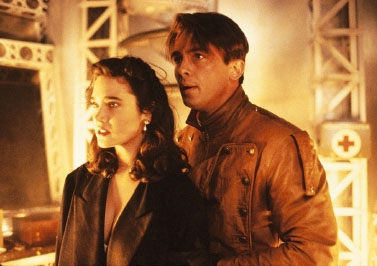I almost wonder if the reason I’m so passionate a defender of the Marvel Cinematic Universe (which I consider ineligible for this column) is that The Rocketeer wasn’t more successful. These days, a sequel would be greenlit about half an hour after the movie hit the theatres, but though they’re making noises about one to come out next year, it will likely be a reboot and not a sequel, because it’s been a quarter-century since the first one. And yet the original movie is one of wit, style, and high adventure that I believe has been underrated and ignored for far too long.
The year is 1938. Cliff Secord (Billy Campbell) is one of any number of young pilots doing stunt shows and racing and so forth, and he’s not making a lot of money at it. And then he crashes his plane because the FBI is chansing gangsters around the airfield, and he’s now even further in debt. Only he and his mechanic, Peevy (Alan Arkin), find some sort of engine in their old biplane after the race, and they quickly work out that it’s designed to be a jet pack.
This spins out into a plot involving Nazi spies, mobsters, old-time Hollywood, and the numptious Jenny (Jennifer Connelly), Cliff’s budding starlet girlfriend. Cliff loves Jenny, but there’s only so willing Jenny is to put up with him, especially since she’s trying to get her own career going. Cliff takes her for granted, and she knows it. She has a taste for a wider world, and he always takes her to the same restaurant by the airfield.
I have always thought Jennifer Connelly would have been a bigger star if she’d actually been living in Jenny’s era; she has a ’40s beauty. This movie not only makes the most of that—Gods, the costuming—but gives her a lot more to do than many other comic book heroines. This isn’t Vicki Vale, a supposed war photographer who screams every time she’s in danger. Jenny whacks a Nazi spy over the head with a vase. Damsel in distress? Well, maybe. But a feisty one. She needs to be rescued, but that’s only because she doesn’t have the same resources as the villain.
I’ve read the comic, but once, long ago. In the comic, the name “Doc Savage” is never used, because the rights would have been expensive, but he’s intended to be the creator of the jet pack. Disney didn’t want to pay the rights, either, and so we get Howard Hughes (Terry O’Quinn) instead. It’s just as well, because we read a few episodes of the Doc Savage radio show on The Dissolve Couch, and I’d be conflicted between the version in the movie and the surly version surrounded by idiots from our rendition of the show.
This movie, to me, also demonstrates why Timothy Dalton wasn’t a more successful Bond. His Neville Sinclair in this movie is so deliciously sleazy—he has the wrong sort of moustache for twirling, but he clearly wants the right kind. Bond is considered too much of a hero, for all I’ve always really disliked Bond. But Neville Sinclair? Oh, he’s a great Dalton role, and Dalton is clearly having enormous amounts of fun with him. How not?
I did not realize, as I was watching Captain America: The First Avenger, that it was also directed by Joe Johnston. Certainly I did not realize that he was hired for that movie based on the skills he showed in directing this one. I did, on the other hand, see the similarities. My notes from seeing it in the theatre mention them. They both have that rich, pulpy feel. The era both movies present is the comic book version of the era in the best possible way. This one, perhaps, draws more on the movies; it’s set just before the greatest year in Hollywood history. But oh, goodness, this is a well-filmed movie with gorgeous production design.
In fact, the year this movie came out, Bugsy won the Oscars in both Art Direction and Costume Design, the two categories I’d say this movie did best. And I would, yes, say that The Rocketeer is better in at least Costume Design than Bugsy. Sure, I’ve seen this movie a lot more, but that can’t be the only reason I find several of its costumes more memorable than anything from Bugsy, which is set in roughly the same era. Maybe it’s just me, but I find this the more memorable portrayal of it, even if it doesn’t have quite the same dignity.
Star Billy Campbell deserves some mention, too, and not just for being the perfect personification of the comic book character—all it really took to make the resemblance complete was a haircut and a jacket. He’s a dashing man in the All-American Boy mode so popular in the era the movie evokes. Alan Arkin doesn’t get enough attention for being the irascible Peevy, whose commentary on the film’s events might as well be our own. Paul Sorvino is a fun gangster as Eddie Valentine, and of course there is Jon Polito as airfield owner Bigelow.
Whether the film failed or was failed is a long, pointless conversation. A movie that I think would have done considerably better decades later, in the Marvel-led superhero boom, failed in the ’90s Tim Burton Batman-led superhero boom. For whatever reason, people weren’t interested. But I was. I think this was the movie that made me think that you could do things with superheroes who weren’t Batman, Superman, and Spider-Man, that there was no reason not to just create your own. I’ll always love this movie for that, not just because it’s a fine movie that doesn’t get enough attention.

